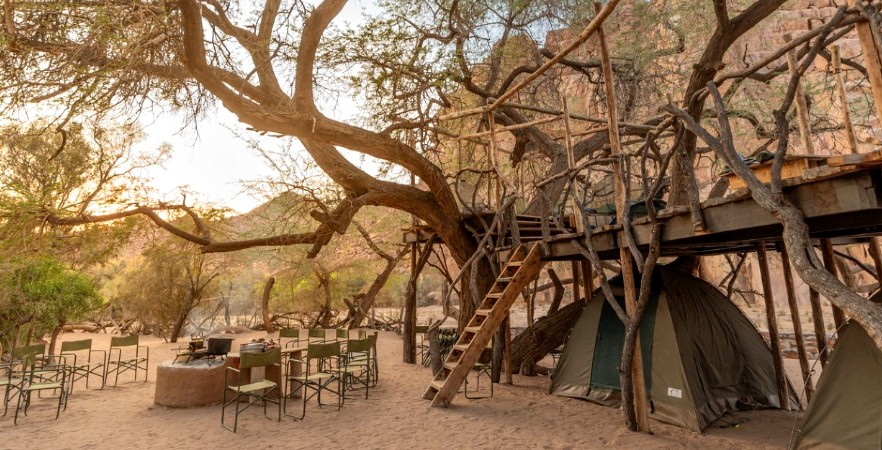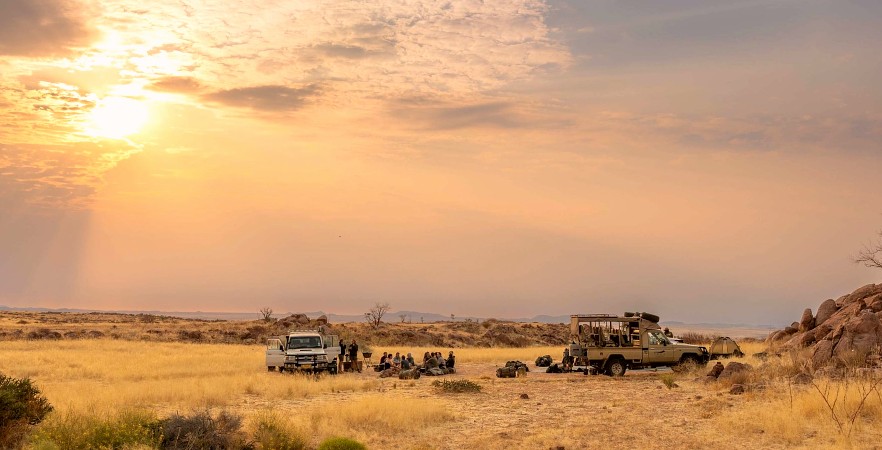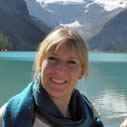Desert Elephant Conservation - Family Trip
Namibia
Our award winning Southern African conservation team work to help protect and research desert elephants in Namibia.
The family volunteering group help educate pupils on how to live safely alongside the wild elephants and repair the school buildings. The family team support the projects vital research by tracking and recording data on the elephants. The aim is to develop a greater understanding of the elephant herds as well as creating a positive relationship between community and desert elephants.
Camp out under the stars and experience life in the beautiful Namibian desert. Experience life in the desert by visiting tribal homes and exploring the wild landscapes.
Help the Desert Elephant Conservation team protect these beautiful elephants’ futures.
Key Info
View More PhotosProject Information
Volunteer role: What will we be doing?
Your family will be part of the desert elephant conservation team who strive to create a positive relationship between the community and desert elephants in the stunning Namib Desert.
The team’s role will involve helping to build and repair school buildings and researching the elephant population out in the desert.
Arrival
Arrive into the historic coastal city of Swakopmund on the Sunday, this gives you time to relax after your journey and explore. During the evening you will meet the team and be given a short induction to the project.
Day 1
On the Monday the group will depart on a 4 hour journey to the desert base camp. You will be given a project induction and tour of the base camp when you arrive.
Day 2 to 4 - School building and education
Each day you will travel to the local school where you take part in the morning assembly and meet the teachers and pupils. At the school the team may help to repaint classrooms and dormitories, build elephant protection fences for wells or vegetable gardens. You will be able to take part in special lessons, after school crafts and sports sessions.
The community live in very close proximately to the desert elephant (with elephants even occasionally passing through the school playing field!) so the team lead elephant education sessions to help pupils to understand how to behave when they are close by and promote elephants positively.
During this week you will be invited by the villagers to visit their family and you can see their homes and what their daily life entails. This is a unique opportunity to learn about and experience tribal life and their culture.
Day 5 - Rest day
Today is the group’s day off so you can relax at the camp or explore the local area.
In the afternoon there is a 3km nature walk for those who would like to take part. The local guide will explain desert survival skills, point out wildlife and special edible plants in the rocky desert.
In the evening there is a group chocolate cake challenge, where the group work together to cook a cake on the camp fire!
In the evening the team will also give the group a briefing on the elephant research.
Day 6 to 9 - Elephant research
The team head out into the desert and wetlands to track the elephants. On the elephant research tracking drive you will travel in a 4x4 vehicle driving along the desert and river looking for signs that elephants have been in the area recently and go for a walk each day to explore the area.
Your family will assist the research staff in monitoring the movements of elephants in the region. You will have an opportunity to learn how to track elephants and you can test out your own tracking skills with the guidance from the local team.
You may assist the research team in:
- Recording elephant movement patterns using GPS positions
- Compiling and updating the herds’ identification notes
- Documenting new births, deaths and other important events such as mating
- Collecting elephant dung for DNA sampling
- Noting any issues relating to the elephants’ health and well-being
During these drives the team may spot other African wildlife including rare black rhinos, giraffe, zebra, springbok, ostrich, oryx and kudu. This is also a great area of bird enthusiasts with some beautiful birds including hornbills, love birds, Egyptian geese, rollers, eagles and even pearl spotted owls. The team will head down to the wetlands area of the river system where the team often arrange a fishing competition.
On day 9 you will head back to base camp.
Day 10 and departure
After a relaxed breakfast the team will pack up and head back to the city of Swakopmund on the Skeleton Coast. The next day you can depart or continue your onward travels.
You can learn more about the project and elephants you will meet here.
Typical day
While based at the school the team will work for a few hours in the morning, then head back to the camp for a break and lunch before returning to the school from around 2pm to 4:30pm.
During the elephant research tracking week the team follow and monitor the elephants, stopping for lunch before usually setting up a new camp location in the late afternoon.
Volunteers travel in the project’s mini-bus and 4x4s.
Other volunteers
There are usually 2-4 families on each trip.
Local support
You will be working alongside the local team at the project which is made of up local and international staff, who are located at the project site where the volunteer accommodation is based. There is a dedicated leader for the family volunteering group.
"The project could not function without the volunteer team helping the special desert elephants. The volunteers can see the difference their hard work and effort immediately makes.” Rachel, Director
Accommodation
On your arrival and departure nights, you will stay in the historic coastal city of Swakopmund. You will need to book your own accommodation in Swakopmund, there are many choices from simple backpackers to luxury hotels and we will provide recommendations.
After heading into the desert, a 4 hour drive from Swakopmund, you will reach Base Camp. It’s a unique setting, camping on a tree platform, with stunning sunsets and even the occasional elephant passing by. The base camp includes a kitchen area, toilets and hot showers.

This project allows families the rare opportunity to appreciate the simple things in life and truly get back to basics, camping in the open air under magnificent African night skies.
While elephant tracking you will stay at a basic camp site in the desert. There is a simple dug toilet and no shower facilities.

There is no electricity at the camp sites but volunteers can charge their electronics and access the internet in Swakopmund.
Meals
Meals at the project are included and the team of volunteers take it in turns to prepare the meals over the camp fire. Here are typical examples of the food you will have:
- Breakfast – porridge, toast, tea and coffee
- Lunch – sandwiches, pasta, salad
- Dinner – spaghetti, curry, fried rice, stew, noodles + the famous camp fire chocolate cake!
Vegetarian and vegan options can be provided.
Drinking water is provided.
When in Swakopmund, there are many restaurants and cafes to choose from.
Getting there
You will need to fly into Walvis Bay Airport (WVB) or Windhoek Airport (WDH).
On arrival, we can arrange a transfer to Swakopmund where you will meet the team. You will stay in Swakopmund for one night, before travelling to the base camp with the team, approximately 4 hours drive into the desert.
Location and free time
The project is located in the Namib Desert, traditionally knowns as Damaraland.
It is a beautiful rural location with desert, rivers and rocky hills and mountains. There are a few small communities within the area and due to the distances between the communities the main schools are boarding schools since it too far for the children to walk from home to school each day. It is a perfect location for evening star watching since there is no light pollution!

When you are in Swakopmund city you can arrange trips to explore the sand dunes, relax at one of the many cafes or visit the seal colony. These activities should be booked in when you arrive in Swakopmund.
Climate
The desert location of the project means it can get quite hot during the day, with average temperatures between 20-35˚C, and quite cold at night. The winter season runs from May to October, where it can get down to between 5-15˚C at night.
Swakopmund city has a mild desert climate with temperatures between 10-25˚C. July and August are cooler months.
Travelling in Namibia before or after your placement
Namibia is next door to South Africa and is an extraordinary destination distinguished by dramatic desert landscapes and endless horizons. It has been described as “Africa for beginners” and a brilliant place to see African wildlife including elephants, rhino and cheetah. Popular activities in Namibia that you may like to combine with your project include:
- Taking a safari drive around Etosha National Park
- Exploring the sand dunes by the Skeleton coast
- Kayaking among hundreds of seals at the Pelican Point seal colony
For more information on Namibia and some of the things we loved when we visited there please see our Namibia country page.

Arrival & Departure
- Start day (day to arrive in Swakopmund): Sunday, see available start dates below
- Departure day (from Swakopmund): Thursday
Duration
The trip is 11 nights, with 2 nights in Swakopmund (arrival and departure nights). You will need to book your own accommodation for these 2 nights.
Start dates
2025: FULL
2026: dates TBC
What's Included
Included
- Dedicated Pod Volunteer specialist to support you from booking on until you complete your trip
- Comprehensive trip planning guide
- Transfers between Swakopmund and the desert base camp
- Accommodation at project - open air camping
- Food - all meals when at base camp and in the desert
- Induction and training
- Support from the team onsite in Namibia
- 24/7 emergency support from the Pod Volunteer UK team
- Donation to Pod Environmental Fund tackling climate change
- 100% payment protection through ABTOT
- Volunteering certificate and reference (on request)
Not included
- Flights
- Transfers to / from Swakopmund from the airport (we can arrange this for you, it costs 350-620 Namibian dollars per person depending on arrival airport)
- Travel insurance
- Vaccinations
- Hotel accommodation in Swakopmund on arrival and departure nights
- Living costs - Swakopmund meals, snacks, drinks, laundry
- Any tourist trips / activities you choose to do in your free time
Price table
| Child (under 18 years old) | £995 | GB Pounds |
| Adult | £1195 | GB Pounds |
Discounts
- £50 discount if you have previously volunteered with Pod Volunteer
Where the money goes - financial transparency
Your fee covers the overseas costs of volunteering and the costs of running our organisation in the UK, on a non-profit basis. For more details and a breakdown of our costs please click here.
Book with confidence - financial protection
All monies paid to us are financially protected through The Association of Bonded Travel Organisers Trust Limited (ABTOT).
Fees in currencies other than GBP are indicative only and volunteers are invoiced in GBP. For current exchange rates please see www.xe.com
Read volunteer reviews from the Family Elephant Conservation project
Lucie
“Pod were amazing helping us work out whether the trip was right for us; patiently answering questions and replying really promptly and informatively; and even checking in during and after the trip. We went on the Namibia family volunteering experience and it was utterly amazing - the local team were excellent and we always felt safe and well looked after whilst having an incredible and purposeful adventure. I’m still dreaming of elephants, sleeping under the stars (and I wasn’t a hardened camper before!) and the smiling faces of the school children. Would highly recommend.”
Emma
“We had the absolute time of our lives on our Desert Elephant Conservation trip to Namibia. As a family of five with the youngest being only eight, we were delighted to find a conservation project that we could all take part in. Pod were excellent at helping us organise everything, work out what we needed and answering our many questions!
This was a holiday with a difference, all of us, kids included, had the most incredible time working with the charity. The project was a real eye-opener for us all but we loved having the opportunity to do some good and make a difference. At many points leading up to the trip I did question if we were crazy, doing a trip like this with children in tow but I know we would all say now it was one of the best things we’ve ever done, a life-changing experience and very special to do it as a family.
Someone asked me recently what we’re planning for our next trip and I honestly can’t think of anything that would beat it! We met inspirational people, made friends, learnt more than we ever imagined and had the most incredible time. Watching the elephants from the platform in base camp, sleeping under the stars and waking to the sound of the crackling wood as the fire was lit for the kettle in the morning were the highlights - truly unforgettable!
Thank-you, we would never have stumbled across this trip without Pod!”
Billy – 13 year old
“Sleeping in the tree house under the stars, Chris’s star gazing thing, playing football with the random guy in the green shirt, trying to teach baby Gami how to throw a ball, climbing the neighbouring hill, sitting around the camp fire wrapped in a blanket, chatting and roasting marsh mallows.
Elephant patrol week is not just following elephants around in a truck, you also see jackals, oryx, giraffes, baboons, meercats, ostrich, rock hyrax and loads of antelopes.
If…you are thinking of volunteering, I have two final words for you - do it.”
William – Father
“Hard to believe that a little over a week ago, we were huddled up in our sleeping bags at the base camp watching the incredible star show that is the Namibian sky during the night!
Enjoying this view while trying to digest the previous 9 days of our time spent building a “hopefully” Elephant proof garden fence, sharing work, meals and kitchen duties with new friends and families from far away homes, going on patrol in search of the desert elephants, hearing and seeing new sights and sounds along with the lessons learned from our intrepid, soulful and knowledgeable guide Hendrick was a bit “heady” to say the least!
The team along with the desert elephant, the children at the primary school and the rugged and awesome natural beauty of Namibia and its people along with your collective passion and commitment to maintain a sense of balance between it all….. is a part of us now, and we are infinitely richer in mind, body and spirit for it. With gratitude, admiration and respect, thank you!”
Ingela and family
“You enter the basecamp and your daily life changes completely and you definitely challenge your comfort zones. You explore emotions and touch feelings you might never felt before. To suddenly see and experience the desert-elephants, those you vision, became a mighty humble feeling as well as a unique memory for life. Counting shooting stars while you sense the smoke from the fireplace and hear the calm breath from some of your peers who are sleeping after a heavy working day.
This is a microscopic extract of what we as a family experienced during two fantastic weeks.
Our contribution to the important mission of the project, and the great employees who make your voluntary weeks a genuine experience, feels small and we hope many more volunteer will support the great work and mission.”

24/7 support
Gemma and the Pod UK team are here to help you throughout your trip
Reserve your place and start your volunteering adventure to Namibia!
BOOK NOWSIMILAR PROJECTS
Here are other popular projects you may be interested in











